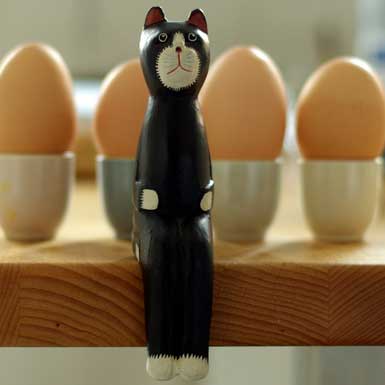Dietary Supplements to Consider for Older Cats

There also hasn’t been a lot of good research into which nutritional supplements are effective or, at the very least, safe. What studies have been done tend to focus on dogs, and there is no guarantee that what works for one species will work for another. Many of my clients are starving (pun intended) for good information about how to provide optimal nutrition to their cats. Therefore, I was excited to run across two papers* investigating nutritional supplements that are potentially beneficial to older cats.
The studies looked at 90 cats between the ages of 7 and 17 that were fed a nutritionally complete diet for the rest of their lives. Individuals in group one received no supplements. Cats in group two received additional vitamin E and beta-carotene (a type of vitamin A), and cats in group three received vitamin E, beta-carotene, omega 3 and 6 fatty acids, and a prebiotic (a non-digestible ingredient that supports the growth of “good” gastrointestinal microorganisms, in this case chicory root).
After 7.5 years, the researchers evaluated a lot of data and found the following:
- Cats in group three lived almost a year longer than those in group one.
- Cats in group three maintained their body weight and had better lean body masses than did cats in group one.
- Other laboratory parameters associated with health (e.g., hematocrit and blood glucose levels) were better in group three cats than those in group one.
- Findings for group two fell in between groups one and three and were generally not statistically different enough to allow conclusions to be made.
These papers provide solid evidence that support the inclusion of extra vitamin E, beta-carotene, omega 3 and 6 fatty acids, and a prebiotic in the diets of middle aged to older cats. Realistically, I wonder how many cats would stand for the addition of all these supplements to their current diets. I think a more practical solution is to look for a high-quality senior cat food that has been formulated with this information in mind after these findings were published in 2006. Items to look for on a cat food’s ingredient list include vitamin E, vitamin A, carrots (a natural source of beta-carotene), flax seed or fish oil (to supply omega 3 fatty acids), animal-based sources of protein like eggs and chicken for omega 6 fatty acids, and a prebiotic like chicory root or beet pulp. Using the MyBowl tool is a simple way to compare diets if you think making a change could benefit your cat.
Dr. Jennifer Coates
Sources:
Cupp C, Jean-Philippe C, Kerr W, et al. Effect of nutritional interventions on longevity of senior cats. Int J Appl Res Vet Med. 2006;4:34
Cupp CJ, Kerr W, Jean-Philippe C, et al. The role of nutritional interventions in the longevity and maintenance of long-term health in ageing cats. Int J Appl Res Vet Med. 2008;6:69–81
Image: Serious cat and eggs by John Blower / via Flickr